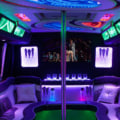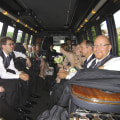Party buses are popular for celebrations, offering a unique and mobile venue for events like birthdays, bachelor or bachelorette parties, and corporate outings. The ability to enjoy alcohol on a party bus adds to the festive atmosphere, but the question of whether party buses can legally sell alcohol is more complex than it might seem. The answer depends on various factors, including state laws, licensing requirements, and the party bus company’s specific policies. Interestingly, these logistics can sometimes intersect with other services, such as self-storage facilities, especially for party supplies or event-related equipment. Here’s an in-depth look at the rules and considerations surrounding alcohol on party buses and how it all ties together. Party buses are popular for celebrations, offering a unique and mobile venue for events like birthdays, bachelor or bachelorette parties, and corporate outings. The ability to enjoy alcohol on a party bus adds to the festive atmosphere, but the question of whether party buses can legally sell alcohol is more complex than it might seem. The answer depends on various factors, including state laws, licensing requirements, and the party bus company’s specific policies. Interestingly, these logistics can sometimes intersect with other services, such as self-storage facilities, especially for party supplies or event-related equipment. Here’s an in-depth look at the rules and considerations surrounding alcohol on party buses and how it all ties together.
Understanding the Legal Framework
The sale of alcohol is strictly regulated across the United States, and each state has its own set of laws governing its distribution and consumption. For a party bus company to sell alcohol directly to passengers, it must have a valid liquor license, which allows the business to legally distribute alcoholic beverages. Obtaining such a license is a complex process, often requiring compliance with state and local regulations, background checks, and approval from licensing boards.
Many party bus companies opt to allow passengers to bring their own alcohol (commonly referred to as BYOB policies) instead of selling it themselves. This approach avoids the legal complexities of obtaining a liquor license while still providing an enjoyable experience for passengers. In BYOB scenarios, it’s essential to ensure that all passengers consuming alcohol are of legal drinking age and that the consumption complies with local open container laws.
Selling Alcohol on Party Buses
If a party bus company decides to sell alcohol, they must adhere to strict licensing requirements. In many cases, the company needs both a liquor license and a permit for serving alcohol in a mobile venue. Additionally, they may face restrictions on where alcohol can be sold and consumed, particularly in areas with stringent alcohol laws.
For passengers, the availability of alcohol on the bus can add convenience, eliminating the need to bring their own beverages. However, it’s crucial to verify in advance whether the party bus provider has the necessary permits to sell alcohol legally. Failure to comply with regulations can lead to penalties for both the company and its customers.
BYOB and Self-Storage Facilities
For events requiring large quantities of alcohol or party supplies, self-storage facilities can play a unique role. For example, if you’re hosting a series of celebrations or need to store bulk items in advance, renting a self-storage unit can provide a secure and convenient solution. Facilities that allow you to rent now offer flexibility, ensuring your supplies are accessible when needed. This can be particularly useful for groups coordinating multiple events or managing larger inventories of beverages, decorations, or equipment.
Safety and Liability
Regardless of whether alcohol is sold on the bus or brought by passengers, safety is a top priority. Party bus companies are responsible for ensuring that the environment remains safe and enjoyable for everyone. Drivers are prohibited from consuming alcohol, and reputable companies train their staff to manage situations involving intoxicated passengers.
Liability is another critical consideration. When alcohol is involved, there is always a risk of overconsumption or disruptive behavior. Party bus companies often have strict policies to mitigate these risks, such as limiting the amount of alcohol allowed on board or requiring a security deposit. Passengers should also understand their responsibilities, including drinking responsibly and respecting the driver and other guests.
Local Laws and Restrictions
Open container laws vary by state and can impact whether alcohol is allowed on a party bus. In some jurisdictions, open containers of alcohol are permitted in the passenger area of a moving vehicle, provided the driver is separated by a partition or is not consuming alcohol. In other areas, open container laws may prohibit alcohol entirely, even on private party buses.
Before booking a party bus, it’s essential to research local regulations and confirm the company’s policies regarding alcohol. This ensures compliance with the law and avoids unexpected surprises on the day of the event.
Enhancing the Experience
Alcohol can elevate the party bus experience, but it’s not the only factor that contributes to a successful event. High-quality sound systems, customizable lighting, and spacious seating all play a role in creating a festive atmosphere. For groups bringing their own alcohol, coordinating coolers, mixers, and glassware ensures that everyone has what they need to enjoy the ride.
Conclusion
Whether party buses can sell alcohol depends on state laws, licensing requirements, and the company’s specific policies. While some providers are licensed to sell alcohol, many choose to implement BYOB policies to simplify operations and comply with regulations. Passengers should familiarize themselves with local laws and the company’s guidelines to ensure a safe and legal celebration.
For those planning events with extensive supplies, incorporating self-storage facilities can streamline logistics. By choosing a facility where you can rent now, you can securely store alcohol, decorations, and other essentials for easy access on the day of the event. Thoughtful preparation and adherence to legal requirements ensure that everyone can enjoy a memorable and stress-free party bus experience.





